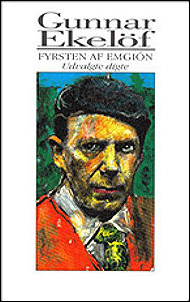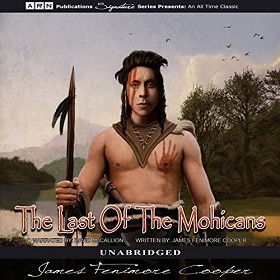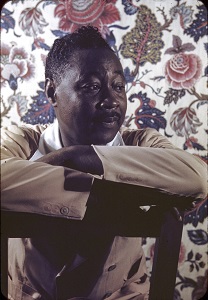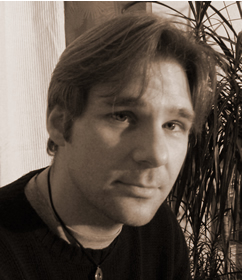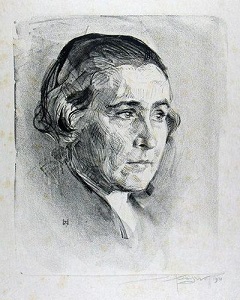De Nederlandse dichter Lucebert werd in Amsterdam geboren op 15 september 1924 onder de naam Lubertus Swaanswijk. Zie ook alle tags voor Lucebert op dit blog.
Wambos
Van rozenhout en snijkunst
nog geuren en kraken de treurige tuinen
de tijd een teng van molm en zweet
beeft murmelt en prevelt
nu leeft en nu zaait sneltastend
stenen vuur met al zijn hoornen
vrouwelijk en manlijk opwaarts
wankelende goed en kwaad gewillig
gaat hij tussen onverschillig alle
wateren der rust
zeggen kunnen vanuit hun nesten
de poppen ik heb dorst & honger
vorstelijk verschijnt de vader
van zijn arbeidsveld nog stoffig
er is bidden en beginnen
en amen en opstaan
maar niet gaan samen ja en nee en niet
de honger baart het lam een lamzak
zo zie toe hoe
vroom vogels de lucht versnijden
een vlees van geest van zout
ook dat ootmoedig en onmachtig
het hart aan huilen hangt
als een trap aan een dak
Stereographie
Naar stad en land van geluk
Zullen wij samen gaan
Niet hier en naast elkaar
Maar hier en daar
En ieder afzonderlijk
Op vuil water voetstappen
Zijn onze handelingen
En onze vrolijkheid is
Een gevangenis vlammende
Maar ver van elkaar in de ruimte
Is de ruimte een tweesnijdend mes
Zijn rechterdaad is sterven
Zijn linkerdaad is de dood.
Teken en tijd
Streng en eenvoudig spreken
met de streng gelovige aarde
de zwaarte voedt het zwevende
in de danser die eens het vallen aanvaardde
en wat is gegeven als teken
de berg de rivier en de afgrond
zorg dat de adem dit opvat
en het bloed in het lichaam het afrondt
ook al dragen zonen uw naam
naar het steeds betere land
gij wijst de weg waar te gaan
want gij zijt Absoloms hand
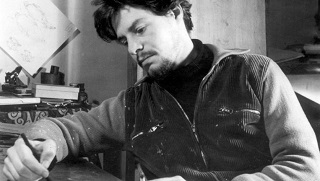
Lucebert (15 september 1924 – 10 mei 1994)
De Nederlandse dichter en schrijver Jan Jacob Slauerhoff werd geboren in Leeuwarden op 15 september 1898. Zie ook alle tags voor Jan Slauerhoff op dit blog.
Nog
Dichten doe ik nog, maar als in droom,
In een droom waarover ’t voorgevoel
Van te ontwaken in een werklijkheid
Die geladen is met ramp op ramp
Hangt als een zwaar onontkoombaar onweer
Dat in laatste stilt zijn donder uitbroedt
Over ’n lieflijk maar al rottend landschap.
Tussen zwammenwoekring bloeien bloemen,
Pluimen rijzen uit vergrauwde grassen,
Maar de meren spieglen vuile wolken
En het bos kromt al zijn volle kronen.
En ikzelf loop in mijn droom, dat landschap,
Eerst nog vergezeld, dan plotseling eenzaam,
Tegelijk loer ik van achter stammen
Om mijzelf van schrik te doen ontwaken
Maar ik ben verlamd – ik wil gaan roepen
Dat het onweer komt en de verwoesting
En daarna de doodlijke verdorring!
En ik roep, maar angst versmoort mijn kreet.
Ook ’t geluid is hier gestorven?
Hoor
Als een beek, onder toelopend rotsdak,
Die zo snel stroomt dat zij niet kan spieglen
De bedreiging die erboven hangt,
Ruist het dwars door ’t droomland, van verbazing,
Dat ik dood voorzie en door moet dichten
En de beek, ontsprongen uit die bron,
Roept met stroomversnelling, stemverheffing,
Maar zo diep dat ‘k niet kan onderscheiden
Of ’t is van verontwaardiging of toejuiching:
‘Dichten doe je nog?’
Ultra Mare
Hier is de wereld niets dan waaiend schuim,
De laatste rotsen zijn bedolven
Na de verwekking uit de golven,
Die breken, stuivend in het ruim.
Het laatste schip wordt weerloos voortgesmeten,
Het zwerk is ingezonken en asgrauw.
Zal ik nu eindelijk, vergaan, vergeten,
Verlost zijn van verlangen en berouw?
Outcast
’t Breed grauw gelaat van de Afrikaanse kust,
Na eeuwen van een ondoorgrondelijk wee
Gekomen tot een onaantastbre rust,
Staart steil terneer op de gekwelde zee.
Ons blijft ’t verneedrend smachten naar de ree.
Geen oceaan heeft onze drift geblust,
En niets op aard, ook zwerven niet, geeft rust,
En de enige toevlucht de prostituee.
Bij haar die achter iedre haven wacht
– Altijd een andre en toch steeds dezelfde –
Wordt ons heimwee tijdlijk ter dood gebracht.
En ook de sterrenheemlen die zich welfden
Over ons trekken, andre iedre nacht,
Zijn eindlijk saamgeschrompeld tot één zelfde.
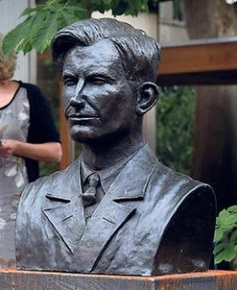
Jan Slauerhoff (15 september 1898 – 5 oktober 1936)
Borstbeeld in Leeuwarden
De Colombiaanse dichter, schrijver, hoogleraar en journalist Sergio Esteban Vélez werd geboren op 15 september 1983 in Medellín. Zie ook alle tags voor Sergio Esteban Vélez op dit blog.
Wilde
For that daring
to love your way,
they cursed you,
they condemned your body,
they spit on you,
believing that they could
spin your essence,
but nothing accomplished
to overcome your genius:
not the cold
that blushed your skin
and hurt your bones;
nor the superhuman days
who surrendered your eyelids
and sealed your breath;
nor dishonor
that punched your ego;
nor loneliness,
that caused your depression;
the pseudo-spiritual anathemas
they could not either
nor the contempt of those who liked
the supraexcellence
of your verb.
Now not even,
fearing sacrilege,
I could pronounce
your name,
Do not repeat your verses.
Your mind knew the truth
and it was more free
that the atrophied consciences,
of masked corruption
of the deaf sheep,
and the naive illogicals,
that were
outside.
And it flourished
with more momentum
your greatness,
and your soul grew
towards the unfading
eternal
dimension
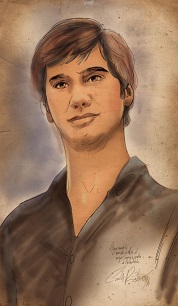
Sergio Esteban Vélez (Medellín, 15 september 1983)
Portret door Carlos Ribero, 2010
De Nigeriaanse schrijfster Chimamanda Ngozi Adichie werd geboren op 15 september 1977 in Enugu. Zie ook alle tags voor Chimamanda Ngozi Adichie op dit blog.
Uit: Half of a Yellow Sun
“Ugwu, sah.””Ugwu. And you’ve come from Obukpa?””From Opi, sah.””You could be anything from twelve to thirty.” Master narrowed his eyes. “Probably thirteen.” He said thirteen in English.”Yes, sah.”Master turned back to his book. Ugwu stood there. Master flipped past some pages and looked up. “Ngwa, go to the kitchen; there should be something you can eat in the fridge.””Yes, sah.”Ugwu entered the kitchen cautiously, placing one foot slowly after the other. When he saw the white thing, almost as tall as he was, he knew it was the fridge. His aunty had told him about it. A cold barn, she had said, that kept food from going bad. He opened it and gasped as the cool air rushed into his face. Oranges, bread, beer, soft drinks: many things in packets and cans were arranged on different levels and, and on the topmost, a roasted shimmering chicken, whole but for a leg. Ugwu reached out and touched the chicken. The fridge breathed heavily in his ears. He touched the chicken again and licked his finger before he yanked the other leg off, eating it until he had only the cracked, sucked pieces of bones left in his hand. Next, he broke off some bread, a chunk that he would have been excited to share with his siblings if a relative had visited and brought it as a gift. He ate quickly, before Master could come in and change his mind. He had finished eating and was standing by the sink, trying to remember what his aunty had told him about opening it to have water gush out like a spring, when Master walked in. He had put on a print shirt and a pair of trousers. His toes, which peeked through leather slippers, seemed feminine, perhaps because they were so clean; they belonged to feet that always wore shoes.”What is it?” Master asked.”Sah?” Ugwu gestured to the sink.Master came over and turned the metal tap. “You should look around the house and put your bag in the first room on the corridor. I’m going for a walk, to clear my head, i nugo?””Yes, sah.” Ugwu watched him leave through the back door. He was not tall. His walk was brisk, energetic, and he looked like Ezeagu, the man who held the wrestling record in Ugwu’s village.Ugwu turned off the tap, turned it on again, then off. On and off and on and off until he was laughing at the magic of the running water and the chicken and bread that lay balmy in his stomach. He went past the living room and into the corridor. There were books piled on the shelves and tables in the three bedrooms, on the sink and cabinets in the bathroom, stacked from floor to ceiling in the study, and in the store, old journals were stacked next to crates of Coke and cartons of Premier beer. Some of the books were placed face down, open, as though Master had not yet finished reading them but had hastily gone on to another.”

Chimamanda Ngozi Adichie (Enugu, 15 september 1977)
De Britse schrijfster Agatha Christie werd geboren in Torquay (Devon) op 15 september 1890. Zie ook alle tags voor Agatha Christie op dit blog.
Uit: Murder on the Orient Express
“Dubosc had overheard part of a conversation between him and the stranger. “You have saved us, mon cher,” said the General emotionally, his great white moustache trembling as he spoke. “You have saved the honour of the French Army – you have averted much bloodshed! How can I thank you for acceding to my request? To have come so far–”
To which the stranger (by name M. Hercule Poirot) had made a fitting reply including the phrase – “But indeed, do I not remember that once you saved my life?” And then the General had made another fitting reply to that, disclaiming any merit for that past service; and with more mention of France, of Belgium, of glory, of honour and of such kindred things they had embraced each other heartily and the conversation had ended.
As to what it had all been about, Lieutenant Dubosc was still in the dark, but to him had been delegated the duty of seeing off M. Poirot by the Taurus Express, and he was carrying it out with all the zeal and ardour befitting a young officer with a promising career ahead of him.
“To-day is Sunday,” said Lieutenant Dubosc. “Tomorrow, Monday evening, you will be in Stamboul.”
It was not the first time he had made this observation. Conversations on the platform, before the departure of a train, are apt to be somewhat repetitive in character.
“That is so,” agreed M. Poirot.
“And you intend to remain there a few days, I think?”
“Mais oui. Stamboul, it is a city I have never visited. It would be a pity to pass through – comme a.” He snapped his fingers descriptively. “Nothing presses – I shall remain there as a tourist for a few days.”
“La Sainte Sophie, it is very fine,” said Lieutenant Dubosc, who had never seen it.
A cold wind came whistling down the platform. Both men shivered. Lieutenant Dubosc managed to cast a surreptitious glance at his watch. Five minutes to five – only five minutes more!”

Agatha Christie (15 september 1890 – 12 januari 1976)
Scene uit de gelijknamige film uit 2017
De Turkse schrijver Orhan Kemal (eig. Mehmet Raşit Öğütçü) werd geboren op 15 september 1914 in Ceyhan. Zie ook alle tags voor Orhan Kemal op dit blog.
Uit: The Idle Years (Vertaald door Cengiz Lugal)
We saw Hasan Hüseyin the night we got back to Adana. We found out that my girlfriend had gone off with a sailor. Gazi’s had got engaged to her cousin who worked as a farmhand in a nearby village, and the Cretan café owner had been busted for dealing hashish and was doing time.
‘How about that?’ mused Gazi. ‘Would you believe it?’
As for me… ‘What are you thinking?’ Hasan asked me.
‘Don’t mind him,’ said Gazi. ‘He just can’t let things go. I don’t know what it is with him – you can’t dwell on these things.’
It was nearly midnight by the time I left them. I went over to the old sycamore tree, where we used to light matches and signal our girlfriends. It seemed to be waiting patiently, resigned to whatever fate might bring.
I leaned against its trunk. In the distance I saw the two brightly lit windows. It all looked exactly the way we had left it. I gave a loud whistle. I noticed two shadows pause at one of the windows. My second whistle created more of a stir. One of the shadows seemed to climb on the sofa. A lamp signalled ‘Coming!’ My face began to twitch, and my left ear started to hum. I thought of how she would break down and apologize… How on earth was she going to explain what she had done to me? How, I wondered? Just how?
She came and stood in front of me without even saying ‘Welcome back.’ We stood silently for a while.
‘Is it true?’ I asked eventually.
She remained quiet.
‘So it is true?’
Still nothing.
‘How did you meet him?’ I asked.
She still didn’t say a word.
‘So,’ I said, ‘I don’t have a chance.’
She raised her head and looked up to the stars, then folded her arms in front of her chest.
‘There’s no way he could love you the way I do,’ I said. ‘You’re going to regret this, believe me. You’re really going to regret it.’
She shrugged.
I flicked away the last of my cigarette and left.”
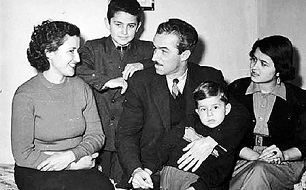
Orhan Kemal (15 september 1914 – 2 juni 1970)
Hier met echtgenote en kinderen
Zie voor nog meer schrijvers van de 15e september ook mijn vorige blog van vandaag.

